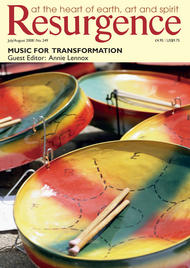FOR THOSE UNACQUAINTED, the first things to know about Frances Moore Lappé are that she is the author of, among many others, the famous 1971 book Diet for a Small Planet, and that to see her speaking live is truly exhilarating and inspiring beyond words. For four decades she has rigorously explored diverse yet interconnected areas, including nutrition, psychology, environmentalism, participatory ‘living’ democracy and personal empowerment.
I first met Lappé two years ago in Geneva, where we both had to give presentations. I was so spellbound by her performance that I asked her for advice as I prepared to give my very first professional presentation – to a room full of the great and the good. She said that when her heart pounds in these circumstances, she thinks of it as “inner applause” – her body is congratulating her for doing what she fears! It worked like magic for me, and I have enjoyed public speaking ever since.
Getting a Grip includes this advice in the context of how citizens can find their voice. We can imagine the person with the beating heart in a local town meeting, getting ready to ask a question, to make a statement, to add their voice to a democratic process. Lappé sees democracy as an activity, a lived experience: “living democracy”.
This living democracy can be seen in many places, can be found in many activities. It can be called upon as a principle, and seen as a call to action. But why do we need it? Democracy, Lappé argues, is often practised as “thin democracy”, or little more than “elections plus a market”. What often takes place is that before officials are even elected, especially for the top job, they receive donations from ranks of corporations keen to invest in access to power. This practice should be eradicated, and replaced with citizen donations, so that officials “run clean”. A Federal Clean Elections approach, in which all citizens contribute six dollars to support all election campaigning for national office, would put officials back into the hands of the people rather than the pockets of corporations. The idea has a dedicated website at www.just6dollars.org
Hearing the voices of the people before those of the corporations is hard enough. Much has been written on the increasing corporate grip on power and its control over the majority of signals that speak to us on a daily basis, including marketing, the media, entertainment, culture, sport, shopping, communications, transport, and so on. The corporate influence in politics is just as pervasive, given the enormous numbers of corporate lobbyists working around the clock to ensure that the interests of their employers come first. In Washington DC, Lappé points out, there are sixty-one lobbyists for each democratically elected official. In the European Union, parliamentarians are outnumbered around twenty to one.
Addressing the increasing concentration of corporate power and influence by cutting down its political stake is likely to be effective to a degree, but how can we go further? Lappé provides many case studies which will truly lift your spirits. The section entitled ‘Citizens are Setting Values Boundaries Within Which Corporations Function’ is replete with examples of citizens getting a grip on corporate behaviour in their local area. However, these are still minority cases, and much is yet to be done on establishing truly effective legal controls on these entities.
What becomes clear, after reading Lappé’s work and simply observing these issues playing out around the world, especially with the focus of a US election year, is that this entire subject – that of human systems failing to support our broader social concerns as well as to protect the biosphere on which we depend – is that this is all a matter of responsibility.
Generally, there is failure to understand, accept and act upon the fact that human responsibility is central – as individuals in our different roles as employees, citizens, politicians and business leaders, as groups, and as a species. The three major groups involved – governments, businesses and citizens – are all, it seems, looking for someone else to sort it out: the mythical ‘they’. In social science we use the concept of ‘othering’. ‘Theying’ is just as problematic. ‘Theying’ is used by either group to refer to either or both of the other groups, and calls for someone else to act. It is almost as if we had no job descriptions that we all could agree on. Lappé shows that we can rewrite the job description for ‘citizen’, bring government and business along with us, and experience what one feisty citizen in the book calls “the fun of power”.
Miguel Mendonça is Research Co-ordinator for the World Future Council. He is author of Feed-in Tariffs: Accelerating the Deployment of Renewable Energy.







